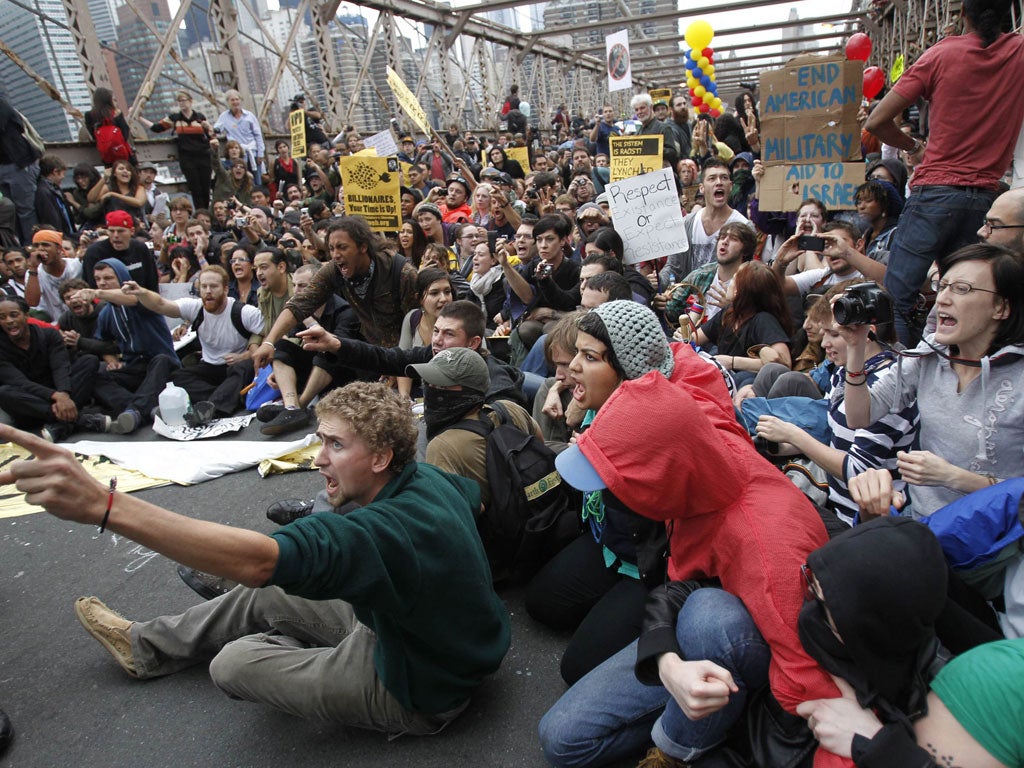Support for 'Occupy Wall Street' protest boosted by mass arrests

Your support helps us to tell the story
From reproductive rights to climate change to Big Tech, The Independent is on the ground when the story is developing. Whether it's investigating the financials of Elon Musk's pro-Trump PAC or producing our latest documentary, 'The A Word', which shines a light on the American women fighting for reproductive rights, we know how important it is to parse out the facts from the messaging.
At such a critical moment in US history, we need reporters on the ground. Your donation allows us to keep sending journalists to speak to both sides of the story.
The Independent is trusted by Americans across the entire political spectrum. And unlike many other quality news outlets, we choose not to lock Americans out of our reporting and analysis with paywalls. We believe quality journalism should be available to everyone, paid for by those who can afford it.
Your support makes all the difference.A two-week old protest movement claiming to "Occupy Wall Street" looked like becoming a cause célèbre after the arrest of 700 people who blocked New York's Brooklyn Bridge over the weekend.
Celebrities expressed their solidarity and descended on the makeshift camp in Manhattan's financial district amid criticism of police tactics, and the protest enters its third week with the attention of the media and the backing of organised unions for the first time.
The disruption on the Brooklyn Bridge marked the moment the Occupy Wall Street protests became too big to ignore, as police moved in with netting to pen demonstrators who were disrupting traffic on the road that spans the East River. The organisers of the march claimed participants had been lured on to the road by police, who had previously seemed to stand aside for them. The authorities insisted there had been repeated warnings that straying from the pedestrian walkway would be regarded as disorderly conduct.
Scenes of protesters being bound with white rope handcuffs and being dragged away by police were yesterday replayed across the internet in the hope that they would galvanise additional support.
One week earlier, a video of a non-violent female protester being pepper-sprayed by a police officer also led to an increase in sympathy for the movement, as well as a 1,000-person march on police headquarters to protest the incident last Friday night.
The protest, conceived by anti-consumerist magazine Adbusters, began two weeks ago with a march on the Financial District by several hundred protesters, but shrivelled to fewer than 200 who planned to camp out in nearby Zuccotti Park. Participants promised to camp in the park through the winter, setting up a soup kitchen and general assembly to articulate their demands.
Until recently, Occupy Wall Street's only noticeable impact has been a heavy police presence around the bronze bull statue that is Wall Street's most famous landmark. The size of the protest has been tiny by New York standards, but its longevity is unusual, and the camp has attracted donations of blankets and food from around the US. Liberal campaigners including the actor Susan Sarandon and filmmaker Michael Moore have come to help out.
After Saturday's arrests, the MSNBC news anchor Dylan Ratigan spoke to the camp, expressing his support. And yesterday Salman Rushdie, the author, became the latest celebrity to back the protests. "The world's economy has been wrecked by these rapacious traders. Yet it is the protesters who are jailed," he wrote on his Twitter account. "The thieves are in their palaces, counting their loot. But now the people are hammering at the palace gates."
The Occupy Wall Street movement has inspired small demonstrations against corporate greed in other cities around the US, including over the weekend in Washington and Los Angeles. The upsurge in support, though, has done little to clarify the aims, or even the main concerns, of the protest.
Protesters wave placards against the war in Afghanistan, against the death penalty on Troy Davis, against home repossessions, and against the loose monetary policy of the Federal Reserve. The General Assembly put out a list of grievances that include environmental pollution and political corruption.
With local unions urging members to join protest marches in the coming days, a movement that the New York Police Department had hoped would have petered out by now looks likely to grow.
Subscribe to Independent Premium to bookmark this article
Want to bookmark your favourite articles and stories to read or reference later? Start your Independent Premium subscription today.
Join our commenting forum
Join thought-provoking conversations, follow other Independent readers and see their replies
Comments